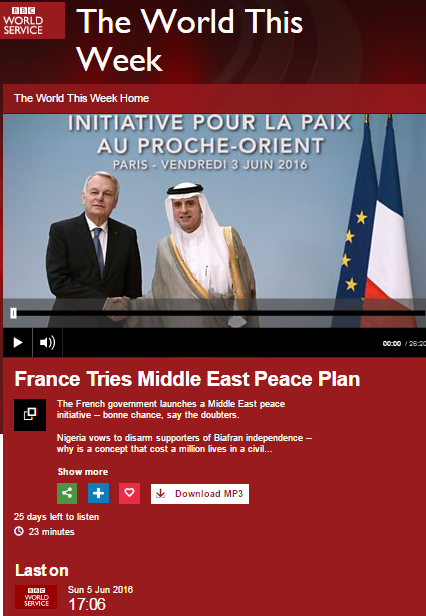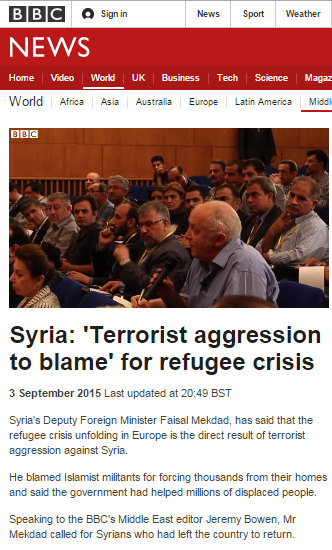Following on from his reporting on the conference hosted by the French government in Paris on June 3rd on the BBC News website and on BBC World Service radio’s ‘Newshour’, Jeremy Bowen also appeared on the June 5th edition of the BBC World Service radio programme ‘The World This Week’, hosted by Peter Hunt.
In that item (from 00:41 here) Bowen repeated some of the themes and messaging promoted in his previous reports as well as introducing new ones.
Listeners yet again heard exaggeration of the significance of the Palestinian-Israeli conflict.
“Just because events between the Israelis and the Palestinians have been largely overshadowed by the war, chaos, tumult elsewhere in the Middle East doesn’t mean that the conflict still isn’t very poisonous. And President Hollande as well said that because of the way that – as he put it – terrorism is spreading around the world, that other countries have a legitimate interest in trying to bring some peace and stability to one of the most troubled places on earth.” [emphasis added]
Once more promoting PLO talking points as he did in his ‘Newshour’ report two days earlier, Bowen again steered audiences towards the view that the main obstacle to a peace agreement is Israeli construction, citing “lots of people” whose identities – and relevant expertise – he declined to share with listeners.
“The idea of making peace by setting up an independent Palestine to exist alongside Israel – the two state solution – lots of people these days say that because of the growth of settlements – Israeli settlements on occupied land which is in defiance of international law; it’s illegal – it’s just physically going to be very difficult for the Palestinians to set up an independent state.”
The Middle East editor made no effort to comply with BBC editorial guidelines on impartiality by informing audiences that the legal view he promotes is just one interpretation of ‘international law’ and that other views also exist.
Despite the wealth of evidence of incitement and glorification of terrorism from official Palestinian sources, Bowen presented that issue using the “Israel says” caveat as he also did in the ‘Newshour’ item. It is of course worth remembering that BBC audiences have not received any serious coverage of the topic of Palestinian incitement since the surge in terrorism began nine months ago and so listeners lack relevant background information on that topic.
“Ah…the Israelis say it’s nothing to do with building houses, as they put it: really the problem is that the Palestinians are brainwashed from early life to hate Israelis.”
A ‘question’ from the presenter gave Bowen the cue for the presentation of a cherry picked view of Israeli politics.
Hunt: “And Israel’s Prime Minister Binyamin Netanyahu last year at the UN said ‘I remain committed to a vision of two states for two peoples’ – do people believe him?”
Bowen: “Well, it’s a question of which Mr Netanyahu turns up because he’s also said that there’ll never be a Palestinian state on his watch.”
The statement to which Bowen refers was made during the 2015 election campaign and – as noted here at the time – it included additional comments.
“When asked if it was correct to say that “…if you are prime minister a Palestinian state will not be established”, Netanyahu replied “indeed”. Before that, however, he gave context which this BBC article does not provide to readers.
“I think that anyone today going to set up a Palestinian state – anyone going to evacuate territory – is simply giving extremist Islam territory for attacks against the State of Israel. That’s the reality which has emerged here in the recent years. Whoever does not understand that is simply putting…burying his head in the sand. The Left does that – it buries its head in the sand time after time.” [translation: BBC Watch]”
Erasing from audience view both the recent failed negotiations to bring the centre-Left Zionist Union into the coalition government and that party’s reappraisal of its stance on the two state solution earlier in the year, Bowen continued:
“He’s [Netanyahu] also put into his government people who are from the far right in Israeli politics which means people who are least likely to make concessions to Palestinians. You know, politically it’s difficult to see how the Israelis could go that way and it’s also difficult to see how Palestinians could make any kind of agreement that meant anything when they continue – politically – to be as split as they are between the two main movements Hamas and Fatah.”
As was the case in the written report which appeared on the BBC News website on June 3rd, audiences were not informed that Hamas is among the Palestinian factions that completely reject the concept of the two state solution and that Fatah is increasingly weakened by internal division.
The most remarkable aspect of this report from Bowen came in the form of a clear Apartheid analogy. [emphasis added]
Hunt: “And is that [Hamas-Fatah] split one of the many challenges facing negotiators like the French?”
Bowen: “Yeah, it’s one of the many, many challenges that are out there. One angle to look at is to say the Israelis are being intransigent. The Israelis don’t want to have a Palestinian state that is anything other than a Bantustan next to them.”
Bantustans were of course a mechanism imposed by the Apartheid regime in South Africa. Analogies between Israel and Apartheid South Africa are employed by anti-Israel activists seeking to delegitimise the Jewish state by signalling that it is a moral travesty of the same order which the world similarly cannot tolerate.
Jeremy Bowen’s job description should mean that he is familiar with the context in which the term Bantustan is used in relation to Israel – and by whom. It should also mean that he is aware of the fact that previous offers of peace agreements such as the Olmert plan in 2008 (rejected by Mahmoud Abbas) and the Clinton parameters in 2000 (rejected by Arafat) proposed a contiguous Palestinian state – not ‘Bantustans’. Despite ostensibly being bound by BBC editorial guidelines on accuracy and impartiality, Bowen nevertheless chose to use that inaccurate and politically motivated term in his report.
Bowen continued with more use of the “Israel says” caveat to describe what the BBC should be capable of telling its audiences in its own words: that Fatah rejects recognition of Israel as the Jewish state, thus refusing to bring an end to future claims and that the PA rejects direct negotiations.
“Ahm…and the other way of putting it – as many Israelis would say – is that the Palestinians haven’t been straight with the outside world; that they’re not prepared to accept a primarily Jewish state alongside them and that eventually they’d want all the territory.”
He closed the item with promotion of the notion of equivalence between the sides.
“When this whole peace process started there were basically two largely secular leaderships talking to each other but on both sides now, religion is more influential and the problem is that when you have people on either side who think that they’re doing the will of God, it’s very hard to make a deal with them.”
As was the case when the last round of talks collapsed in April 2014, BBC audiences have been provided with selective information on the subject of the Paris conference and the wider issue of negotiations between Israel and the Palestinians which has passed through the Jeremy Bowen filter. In those two years, Bowen has gone from second-hand amplification of the ‘apartheid’ trope to direct use of apartheid analogy. Little wonder then that BBC audiences are being sold short on the corporation’s pledge to enhance their understanding of this particular “international issue”.
Related Articles:
BBC News produces eight versions of report on three-hour Paris meeting
What is missing from the BBC’s ME peace process narrative?




